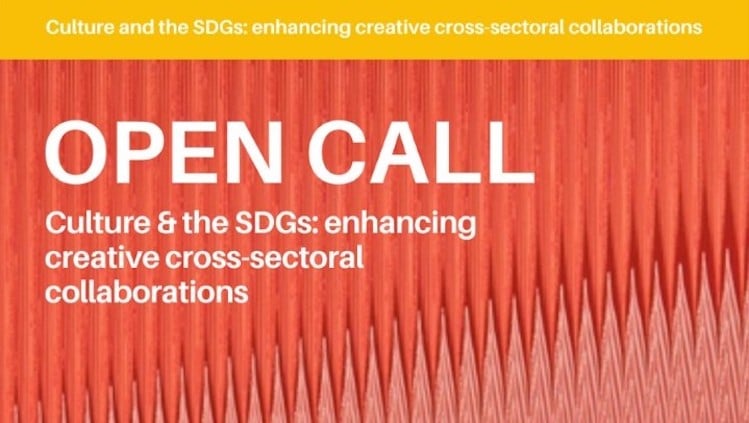Culture and the SDGs is an experimental project that sits somewhere between an action research, capacity-building training, and a creative residency. At one end, it seeks to raise awareness about the UN SDG framework within the cultural and creative industries (CCIs) and highlight the inherent interlinkages between culture and the Sustainable Development Goals (SDGs,) while at the other end simultaneously encouraging professionals from other sectors (such as education, environment, and policy) to engage more actively with the culture sector. It wishes to provide a space for developing open collaboration models for inclusive sustainable development that draw from creativity and cultural expression, as much as from sectoral expertise in combatting the world’s most pressing problems. The project aims to create these publicly accessible models so as to facilitate collaboration between diverse actors, and in parallel, define the potential of culture in the successor of the 2030 SDGs, sharing the insights across the CCIs through creative advocacy media. Lastly, it also aims to extend the discussion on culture’s role in the SDGs, to better understand the opportunity for culture to feature as an explicit goal or as an implicit transversal actor, within the post-2030 framework on sustainable development.
marine biologist x sculptor
food security expert x music producer
good governance specialist x museum curator…
The possibilities for holistic collaborations to achieve the Sustainable Development Goals are endless – and yet, they often remain under-utilized, as culture takes a back seat in the sustainable development discourse.
Why is this relevant?
The 2030 Agenda for Sustainable Development (adopted by the United Nations Member States in 2015) has at its heart 17 SDGs, which navigate across various thematic areas, and are geared towards achieving global prosperity. However, culture as a thematic area has been missing from the sustainable development conversation and is not a part of any of the 17 established goals. Indeed, culture is referred to in only two of the 169 targets, namely target 4.7 and 11.4. This lack of an explicit and tangible link between the culture sector and the SDGs in public discourse has often translated into the two being viewed and addressed as mutually exclusive concepts, greatly diminishing the role that culture plays towards the holistic development of the society.
The project emerges from the belief that the knowledge of the SDGs within the CCIs is often scattered and limited to the practice of specific sectors, and requires wider awareness raising. Another gap in the conversation the project aims to address is the limited sensitization of the other sectors on the potential of arts and culture in contributing to their activities in achieving the SDGs. To address these challenges and make the presence of culture explicit in the sustainable development context as opposed to its current implicit role, concerted efforts and interdisciplinary collaborations are required both at the policy and the grass-root levels.
What to expect?
A stimulating online programme with fresh perspectives on creative cross-sectoral collaborations for sustainable development, followed by a five-day in-person residency programme for the selected participants to exchange and brainstorm on collaboration models.
Who can take part?
Eight CCI professionals and eight professionals from other sectors (such as education, environment, and policy), who have geared their practice towards sustainable development. The participants must be:
- emerging or mid-career professionals, aged between 25 and 40 years old at the time of application
- professionals in the CCIs or preferably be working in the sectors of education, environment, or policy (participants from other sectors of work are welcome to apply)
- familiar with the UN Sustainable Development framework
- actively engaged in activities contributing to the SDGs, and must have either implemented a related project in the past, or propose a new project for implementation, ensuring cross-sectoral collaborations
- open and willing to address contrasting ideas and challenge traditional forms of collaboration, to develop the frameworks of creative collaboration models, combining diverse viewpoints and bridging sectors
- professionally proficient in English, as the activities of the project will be conducted entirely in English
- able to commit fully to the online sessions (2-3 sessions, up to 3 hours/day) and the in-person programme (full day) of the project
When?
The online sessions will take place between late August and early September. The in-person residency programme will be held between Monday, 12 September 2022 and Friday, 16 September 2022 (arrival on Sunday, 11 September 2022 and departure on Friday, 16 September 2022 in the afternoon/evening).
Where?
The online sessions will be conducted on Zoom and the in-person residency programme will take place in Istanbul, Turkey (Covid-19 and other travel restrictions permitting).
Costs incurred
The Culture and Sustainability Lab will book and pay for travel to and from Istanbul, accommodation from 11 to 16 September and any other incidental expenses during the programme. Participants may incur some costs based on the Covid-19 regulations, if unvaccinated.
Further questions?
Take a look at our FAQs.
How to apply
Fill in the application form by 26 June 2022, 23:59 Central European Time. The project welcomes participants of all nationalities. You will be asked to explain your motivations for applying and upload your CV. The application form must be completed in English.
The results will be announced by mid-July, please note that only successful candidates will be informed.
About the project and the team
This project is funded by the European Union through the Cultural Relations Platform, and hosted by the non-profit organization Culture and Sustainability Lab. The residency programme of the project is being organised with the kind support and collaboration of the Austrian Cultural Forum Istanbul. The project team comprises alumni of the EU-funded Global Cultural Relations Programme 2021, hailing from Slovenia, India, Indonesia, Uzbekistan, and Germany.

